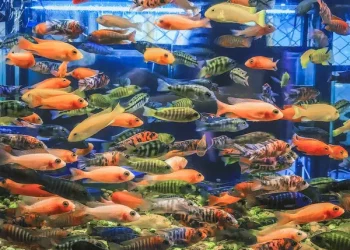Lungfish are a fascinating group of fish that have captured the attention of scientists and nature enthusiasts for decades. These creatures have evolved to survive in some of the harshest environments on Earth, including bodies of water that are low in oxygen or prone to drying up. One of the most interesting aspects of lungfish is their lifespan, which can vary depending on the species and the conditions they live in.
There are six species of lungfish that are currently known to science, and each has its own unique characteristics. The African lungfish (Protopterus spp.), for example, can live for more than 20 years in captivity, while the Australian lungfish (Neoceratodus forsteri) can live for up to 100 years in the wild. Other species, such as the South American lungfish (Lepidosiren paradoxa) and the West African lungfish (Protopterus annectens), have a lifespan of around 15-20 years in captivity.
One of the reasons why lungfish can live so long is that they have a slow metabolism. This means that they don’t need to eat as much as other fish to survive, and they can conserve their energy for longer periods of time. Lungfish also have a unique ability to enter a state of suspended animation when conditions are unfavorable, such as during droughts or when their habitat is polluted. During this time, the lungfish’s metabolic rate slows down even further, allowing it to survive for months or even years without food or water.
Another factor that can affect the lifespan of lungfish is the conditions they live in. For example, lungfish that are kept in captivity tend to live longer than those in the wild, because they are protected from predators and have a steady supply of food and clean water. On the other hand, lungfish that live in polluted or degraded habitats may have a shorter lifespan, because their immune systems are weakened and they are more vulnerable to disease.
In conclusion, the lifespan of lungfish can vary depending on the species, the conditions they live in, and other factors such as genetics and diet. While some species can live for several decades, others have a much shorter lifespan. Despite their differences, all lungfish share an incredible ability to adapt to their environment and survive in some of the most challenging conditions on Earth.

























